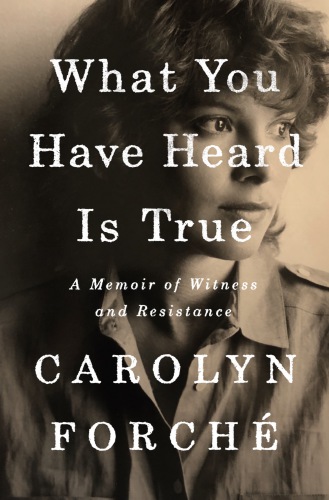
What You Have Heard Is True
A Memoir of Witness and Resistance
کتاب های مرتبط
- اطلاعات
- نقد و بررسی
- دیدگاه کاربران
نقد و بررسی

October 15, 2018
Distinguished poet Forché is known for being radically engaged; for instance, she's the editor of the anthology Against Forgetting: Twentieth-Century Poetry of Witness. Here she recounts how, decades ago, the charismatic relative of a friend drove from El Salvador to ask her to visit his country. Once there, Forché stayed one step ahead of the death squads, learning about extreme poverty and oppression as protesters were attacked and priests and farm workers murdered. With a national tour.
Copyright 2018 Library Journal, LLC Used with permission.

February 1, 2019
A noted poet and activist recounts an odd season at the dawn of the civil war in El Salvador.At the opening, Forché (English/Georgetown Univ.; Blue Hour, 2003, etc.) admits she had only a little knowledge of the Central American nation of El Salvador until the end of the 1970s. "What I knew of El Salvador, I knew from my Spanish professor in college, himself a Salvadoran," as well as from translating the work of the poet Claribel Alegría. At the beginning of the narrative, the author recounts how she opened her door one day to a man whom Alegría had mentioned without much specificity: Leonel Gómez, a mysterious figure who sometimes seemed to be all things to all people. Gómez convinced Forché that she needed to see what was happening for herself, and off she went to a nation on the brink. A bête noire soon came into view: Colonel Chacón, "who chops off fingers and has people disemboweled." Gómez was a born mansplainer, throwing out a sequence of lessons that prompted Forché to protest that she was smart enough to follow along, to which he replied, "Lesson three has nothing to do with you." The remark was ominous, to say the least. Gómez, her Virgil, guided Forché into tight corners, such as the cramped office of a commander who earnestly asked, "what can we do to improve the situation?" Alas, the time for talking drew short, and the bullets began to fly--some of them, it seems, deliberately aimed at her. As Forché writes in her elegiac opening, "I will learn that the human head weighs about two and a half kilos, and a child's head, something less." Episode by episode, dodging death squads, Forché builds a story filled with violence and intrigue worthy of Graham Greene around which a river of blood flows--doing so, unstanched, with the avid support of America's leaders.A valuable firsthand report of a time of terror.
COPYRIGHT(2019) Kirkus Reviews, ALL RIGHTS RESERVED.

October 28, 2019
Poet Forché (Blue Hour) writes intensely about her visits to El Salvador as the country edged toward civil war in the late 1970s. A poetry professor in Southern California, Forché knew little of El Salvador and its “silence of misery endured,” until Leonel Gómez Vides—a friend’s cousin, coffee farmer, and rumored CIA operative “too mysterious for most people”—appeared on her doorstep in 1977 and, inspired by her writing, invited her to visit and learn about his homeland
. Arriving in El Salvador four months later, she and Leonel met with political and military figures—saying she was a poet, journalist, and professor on a fellowship to the country—to create an illusion of influence, which he explained “might save your life” as the nation slid into chaos. Working alongside an overtaxed rural doctor with few medical supplies, farmers barely subsisting off the land, and a wealthy socialite involved in the resistance, she documented the growing brutality, hoping to translate it into poetry, spurred by Leonel’s insistence that “This place is a symphony of illusion... and an orchestra needs a conductor.” These notes became the basis of The Country Between Us, her 1981 poetry collection that addressed the atrocities in El Salvador. Forché’s astute, lyrical memoir offer glimpses into life in a war-torn country and contextualizes her early works of poetry. Agent: Bill Clegg, The Clegg Agency.

Starred review from February 15, 2019
Poet Forch�, an advocate for poetry of witness, has compiled two genre-defining anthologies: Against Forgetting: Twentieth-Century Poetry of Witness (1993) and Poetry of Witness: The Tradition in English, 1500-2001 (2014). In this galvanizing memoir, she recounts her political awakening under fire with a poet's lyrical acuity and a storyteller's drama. A summer in Mallorca with a friend and her mother, the Central American poet Claribel Alegr�a, led to the unexpected and fateful appearance of Alegr�a's mysterious cousin, Leonel G�mez Vides, at Forch�'s door in California. Dashing and mesmerizing, he talks with ferocious intensity about his country, El Salvador, its impending civil war, and how, as a poet and an American, Forch� can help the resistance in its fight against state terror. Although Forch� is warned against traveling to El Salvador in 1978, she spends much of the next two years in that land of brutal poverty, death squads, and roadside corpses, as G�mez Vides propels her into shockingly perilous situations, saying, Try to see. Forch� recounts her frightening and transformative encounters with scorching specificity and portrays her brilliant and courageous mentor and other resistance fighters with wonder and gratitude. This clarion work of remembrance, this indelible testimony to a horrific battle in the unending struggle for human rights, justice, and peace, stands with the dispatches of Isabel Allende, Eduardo Galeano, Pablo Neruda, and Elena Poniatowska.(Reprinted with permission of Booklist, copyright 2019, American Library Association.)

























دیدگاه کاربران